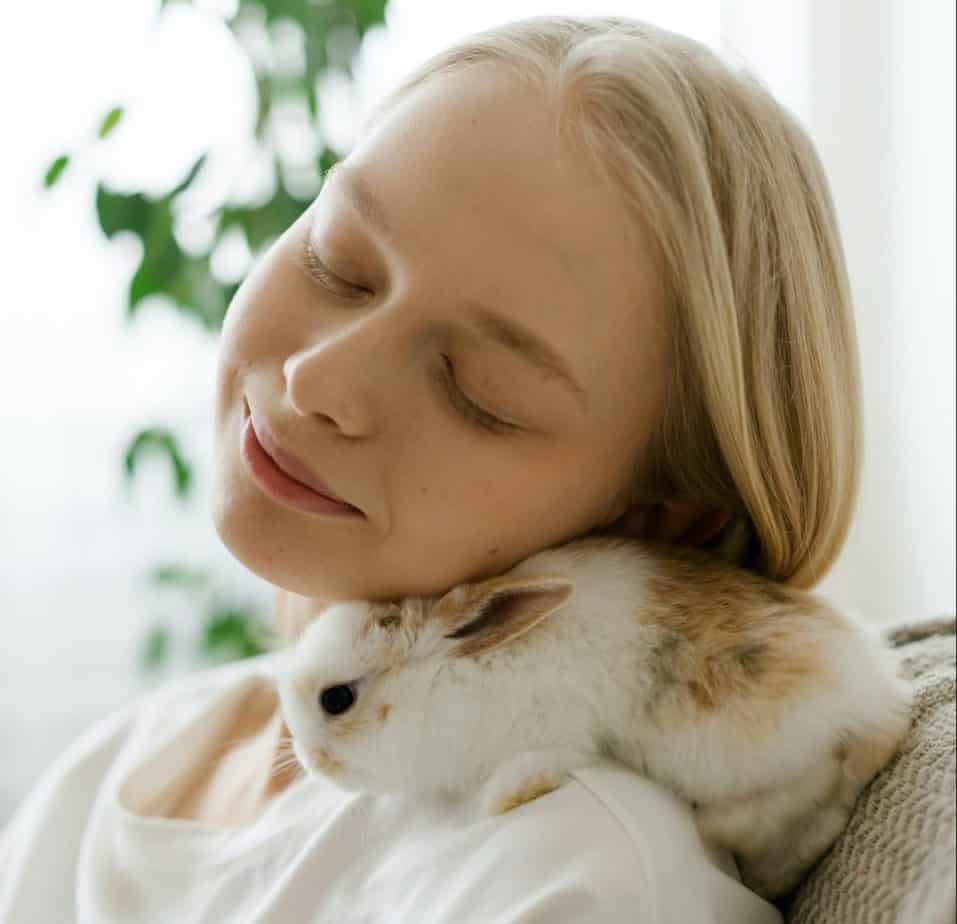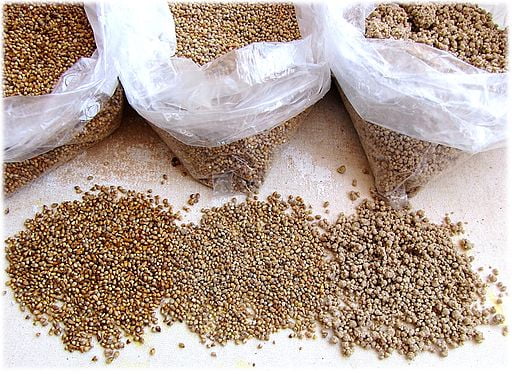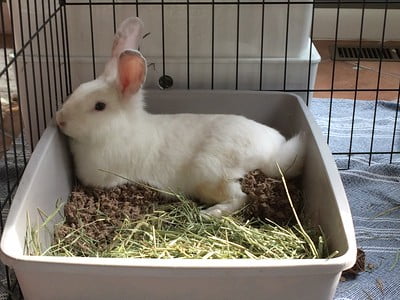Last Updated on March 14, 2023 by Marjon Ramos
The most common reasons why rabbits bite are: asserting dominance, protecting their food, past trauma, hormonally related aggression, stress, pain, or as a defense mechanism.
Rabbits can also bite as a way to get your attention.
If your rabbit is only nipping you to get your attention, make a loud squealing sound every time your rabbit does it to let them know that it’s not okay to bite you for attention.
In my experience, the best way to prevent your rabbit from biting is to neuter or spay him.
Neutering a rabbit would remove any unwanted hormonal-related aggression, such as biting.
It’s best if you neuter your rabbit before they reach sexual maturity at around 6 months old.
Now that I’ve given you the gist of the article, read on as I explain in more detail why rabbits bite:
Table of Contents
Common reasons why rabbits bite.
In order to properly build a plan to prevent your rabbit from biting, we must first know and understand why they do it in the first place.
Remember, we have to be patient with our pets because they’re prey creatures. They’re not biting just for the heck of it.
Here are the most common reasons why rabbits bite:
Asserting dominance.
Asserting dominance generally happens to male rabbits that reach sexual maturity or at around 6 months old.
You will especially notice this behavior when there are two male rabbits in a single enclosure.
At first, you will likely notice some fresh wounds on one or both of your rabbits.
But as time goes on, one of them will eventually win, and the other will likely not eat due to intense fear.
That’s why it’s important to neuter both rabbits before they reach puberty because they’ll most likely fight (sometimes till death).
Rabbits would also try to assert their dominance over their owners if they’re aggressive enough.
Some would bite, kick, and dig on their owners.
Food aggression.
As mentioned above, once a rabbit asserts its dominance, the other rabbit must wait for the dominant rabbit to finish eating before they eat.
This is especially dangerous because a rabbit that’s not eating for long periods of time could develop dangerous digestive problems like GI stasis, which could lead to death.
While food aggression most commonly happens between unneutered rabbits, sometimes, when a rabbit is territorial or extremely hungry, it can attack or bite its owners if they get too close to their food.
Past trauma or abuse.
Another common reason why rabbits bite is past trauma or abuse.
Rabbits that have been abused in the past or denied human contact (kept in small cages) from an early age would likely be aggressive towards humans.
In this case, you need to be patient with your rabbit and understand that they’re only doing their best to protect themselves.
Hormonal related aggression.
Hormonal-related aggression starts when a rabbit enters puberty or around 6 months.
The most common of these are biting, spraying, and being territorial.
Unneutered rabbits are generally not good pets. That’s why it’s important to neuter your rabbit before they reach 6 months old.
Defence mechanism.
Sometimes, rabbits will bite as a defense mechanism because they don’t trust whoever it is that they’re biting.
This is commonly reported to new rabbit owners.
You see, rabbits take time to trust someone.
As prey creatures, rabbits have anxiety to pretty much everything that moves.
If your rabbit is new, give them time to adjust to you and their current environment.
If they’re not letting you touch them, just leave them alone for now and try again later (with some treats).
Territorial aggression.
Territorial aggression is more common in pregnant rabbits or rabbits that are protecting their kits.
If your rabbit just gave birth, gently remove the mama rabbit first before touching her kits.
Extreme pain.
Rabbits that are sick or experiencing extreme pain will likely bite if touched the wrong way.
You can tell that your rabbit is in pain if it’s accompanied by other symptoms like loud teeth grinding, low energy, high-pitched noises, rapid breathing, and appetite changes.
Immediately bring your rabbit to a veterinarian if you notice any of these symptoms.
Stressed induced aggression.
Sometimes, stressed rabbits will bite due to sheer frustration of whatever it is that’s stressing them.
Lack of exercise is the most common cause of stress in rabbits.
Rabbits that are kept in small cages for long periods of time could develop anti-social behaviors such as biting due to stress.
Rabbits are made to wonder and explore nature all day long.
That’s why it’s recommended to let your rabbits run around for a few hours each day to expend that unused energy.
Why do rabbits bite their owners but no one else?

Rabbits biting their owners but no one else could mean that your rabbit is scared of you or don’t trusts you enough that you won’t hurt them back.
Rabbits are always scared of any new people they encounter.
It could also be due to the fact that your rabbits are suddenly getting territorial.
If you want this behavior to stop, you can try making loud sounds every time your rabbit bites you to let your rabbit know that it’s not okay to do that.
Also, make sure that your rabbit is neutered or spayed.
Why do rabbits bite your fingers?
Rabbits biting your fingers is likely due to the fact that you touched them in areas they didn’t want to be touched.
Generally, rabbits don’t like to be touched on their necks, stomachs, and butts.
It could also be due to the fact that you’re trying to lift your rabbits.
Some rabbits are really sensitive to being lifted up and will thrash and bite to prevent it.
Finally, rabbits biting your fingers could mean that your rabbit doesn’t trust you yet.
This could happen if the rabbit is new or if they have been abused in the past.
Be patient with your rabbits and give them the space they want.
Remember, they are prey creatures, so they are naturally untrusting.
Why do rabbits bite your feet?
Rabbits biting your feet is likely due to the fact that you’re in their way.
Some rabbits are really impatient and will bite anything that’s blocking their way.
Rabbits biting your feet could also mean that your rabbit is trying to get your attention.
Rabbits often get excited and run around their owner’s feet whenever they see them because they’re expecting playtime or food.
Though sometimes your rabbits could nip on your toes, which basically means faster give me those treats!
Why do rabbits bite their cages?
Rabbits biting their cages is likely due to boredom. Rabbits need regular exercise in order to thrive.
If you are keeping your rabbits in their cages all day, biting them is a sign that your rabbit is frustrated with their current environment.
Letting your rabbits out to exercise for a few hours each day could help expend their energy.
You should also consider letting your rabbit free roam around the house.
At the very least, get them a big enclosure that would let them get enough exercise.
Why do rabbits bite your clothes?
Rabbits biting your clothes could mean that they’re bored. Rabbits love to chew on things.
So if your clothes happen to be nearby, and they’re bored, your rabbit will most likely chew on them.
That’s why it’s important to “bunny proof” your home before getting a rabbit and continue to do so until the end.
This means you cannot leave anything of value (clothes, wires, etc.) on the floor or anywhere your rabbits can reach.
How to stop your rabbits from biting you?
First and foremost, get your rabbits neutered or spayed.
This would greatly reduce any hormonally related aggression rabbits exhibit once they reach sexual maturity.
If your rabbit is still biting you, make a loud squealing sound whenever your rabbit bites you to signal to them that it’s not okay to do that.
Finally, be patient with your rabbits if they’re still biting you. It could take a long time for rabbits to trust that you’re not a threat to them.




